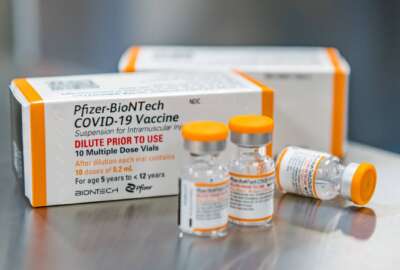GSA says vast majority of contractors agree to implement vaccine mandate
More than 90% of GSA's contractors have signed agreements incorporating the mandate into their contracts, including 95% of vendors on GSA's Federal Supply Schedule.
Although the Biden Administration’s vaccine mandate for federal contractors still faces numerous court challenges from state attorneys general, individual contractor employees and other opponents, companies themselves aren’t putting up much of a fight — at least if the General Services Administration’s Federal Supply Schedule program is any indication.
As of this week, the overwhelming majority of the 12,000 companies who do business with the government via the GSA schedules have agreed to implement the mandate. Ninety-five percent of those firms have signed contract modifications to add a clause implementing the mandate for their own workforces. And across the broader portfolio of other types of contracts GSA’s Federal Acquisition Service administers, the figure is 91%, said Mark Lee, FAS’s assistant commissioner for policy and compliance.
“GSA remains committed to the safety of our federal workforce, our contractors, the agencies we serve, and we appreciate the hard work and dedication of our contractors,” Lee told vendors this week during the Coalition for Government Procurement’s fall training conference. “We’ll continue to keep you involved and do our best to be a value-added partner, and thank you for the tremendous response on the modification.”
Of course, even if schedule holders had reservations about implementing the mandate within their own companies, it wasn’t exactly optional — at least not if they wanted continued revenue from the Schedules program.
A class deviation and accompanying guidance GSA published on Sept. 30 made clear that companies would not be allowed to get new schedule orders from government customers if they didn’t agree to the mass contract modification by Nov. 14. Earlier this week, the agency temporarily removed those that missed the deadline from its electronic marketplaces, such as GSA Advantage.
“But once they accept the modification, those contracts can become visible again within the next day,” he said. “That’s to help prevent any compliance issues with our customers ordering from a contractor that is not eligible to receive an order.”
As of now, the contract clause obligates companies to implement policies to require their employees to be fully-vaccinated by Jan. 18, meaning they’d need their second Pfizer or Moderna shot — or their first Johnson & Johnson shot — by Jan. 4. They’ll also be responsible for administering their own programs to decide on medical and religious exemptions for workers who wish to decline vaccination.
But the clause is highly unusual, if not unprecedented, in the sense that it doesn’t put companies’ compliance obligations into concrete contract language. Instead, it requires them to implement whatever contractor-specific instructions the government’s Safer Federal Workforce Task Force issues, which can change at any time.
The high compliance rate also comes in spite of the fact that GSA’s implementation of the contractor mandate is more far-reaching than many other federal agencies.
President Biden’s executive order didn’t strictly require contracts involving the sale of products to be covered. And it exempted contracts below the government’s $250,000 simplified acquisition threshold. But at least with the schedules program, GSA decided to apply the mandate to contracts all the way down to the $10,000 micro-purchase threshold, and for both products and services.
“There’s a couple reasons for that,” Lee said. “First, the Safer Federal Workforce Task Force guidance strongly encourages agencies to incorporate the clause in contracts that are solely for products. And looking at the nature of the schedules program, it wasn’t administratively feasible to distinguish contracts that are solely for products from contracts that include things like ancillary-type services, installation, maintenance, and training through our order-level materials authority. And it really simplified our compliance tracking, our industry partner communication and our customer messaging.”
But GSA said it isn’t treating the January deadline as an absolute cliff. In other words, companies won’t necessarily be penalized solely because 100% of their covered workforce hasn’t been vaccinated or exempted.
“If you cannot get all of your covered employees vaccinated by the deadline, GSA really views acceptance of the modification as an agreement that the contractor intends to comply with the terms,” Lee said. “Within the federal government, we’re using our human resource departments to take steps to implement the executive order for our own employees, and we expect contractors to do the same thing. If a covered contractor is demonstrating progress and meeting those requirements, GSA will work with those contractors to ensure that they have the time and opportunity to achieve full compliance.”
Copyright © 2024 Federal News Network. All rights reserved. This website is not intended for users located within the European Economic Area.
Jared Serbu is deputy editor of Federal News Network and reports on the Defense Department’s contracting, legislative, workforce and IT issues.
Follow @jserbuWFED






